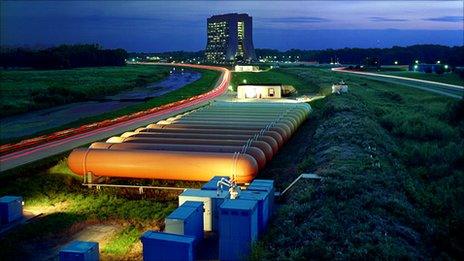US lab clears Higgs hunt hurdle
- Published

The Tevatron is currently due to cease operations in 2011
An expert panel has recommended extending the lifetime of a US "particle smasher" by three years.
This will allow the Tevatron accelerator in Illinois to continue its hunt for the elusive Higgs boson particle.
The panel proposes the facility continues operating until 2014, pitching it against the Large Hadron Collider (LHC) in the race to find the Higgs.
The Higgs is a sub-atomic particle crucial to current theories of physics.
On Tuesday, the High Energy Physics Advisory Panel (Hepap) committee voted by 14 votes to one to keep running the Tevatron until 2014.
Hepap reports to the US Department of Energy and is the highest panel in the US making recommendations on future particle physics projects.
The Tevatron is operated by the Fermi National Accelerator Laboratory (Fermilab).
The US machine and the Europe-based LHC are competing to be first to identify the Higgs. But extending the lifetime of the US accelerator is a potential game-changer.
Some physicists say the LHC may not be in a position to detect the Higgs for two to three years.
But the two accelerators could also work in a complementary way - measuring different properties of this particle.
The European machine will continue operating at around half its design energy until 2011. It will then be shut down for up to a year for maintenance work.
Professor Stefan Soldner-Rembold, from the University of Manchester, who is a spokesman for "DZero", an experiment at the Tevatron, said that the extension had strong backing from the particle physics community.
He said the bid had even been supported by physicists working on the LHC who saw it as an "excellent opportunity for particle physics".
HEPAP also recommended more funds be allocated to the Tevatron. But the extension will not receive the full go-ahead until the Department of Energy's next budget is finalised.
It is expected that Fermilab will need an extra $35m per year to operate the Tevatron into 2014.
Some of the funds could come from Fermilab budget, but the lab is likely to need an additional injection of money to foot the bill, sources say.
- Published22 July 2010
- Published14 July 2010